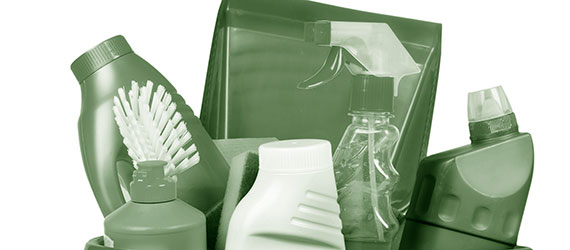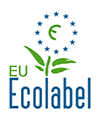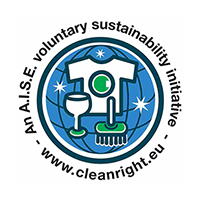Sustainability accreditation and labelling schemes
Schemes that accredit or label components of the cleaning process such as products, equipment and tools are potentially very valuable in making it easier for organizations that run those processes to improve their sustainability.

But everything depends not only on the soundness and relevance of the individual criteria, but on how well the components dovetail together.
The aim should be to have a process which is more sustainable across its whole life cycle and more sustainable in social and economic as well as environmental terms. Without proper consideration of the big picture, it would be easy using labelled or accredited products to make the cleaning process much less sustainable.
Cleaning products
The EU ‘Flower’ eco-label scheme has been in place since the early 90s. While it has long been possible for manufacturers to gain labels for some products sold for professional cleaning, the criteria for all except professional laundry and machine dishwash products are based on consumer products. Professional cleaning is more eco-efficient than consumer cleaning, not least because of its use of concentrates, accurate dosing systems and mechanized equipment. Consumer style products would thus be unlikely to be suitable in sustainability terms for any but the smallest scale, quasi-domestic, building cleaning for example.

The EU Flower criteria for cleaning products have, since their inception, placed great emphasis on reducing the use of certain ingredients, including those with higher hazard classifications, irrespective of scientific risk assessments which assess whether or not these hazards will give rise to risks. The criteria have also tended to hinder rather than encourage the use of concentrates, which are of great benefit in making professional cleaning more sustainable. As a consequence the label has remained controversial, and though many products on the market could comply with the criteria, especially at use dilution, they have not been submitted for a label.
The Nordic Swan also offers eco-labels for cleaning products. Criteria are often closely aligned with the EU Flower criteria, having been the basis for the latter’s development.
A.I.S.E Charter for Sustainable Cleaning
A different approach to accrediting cleaning products is provided by the A.I.S.E. Charter for Sustainable Cleaning. The original 2005 version of the Charter focused on accrediting the supplier company, as having sound sustainability and safety assurance procedures in place covering key elements from product design to management of impacts during product manufacture and distribution.

The subsequent Charter 2010 broke new ground by developing criteria for specific product types: products carrying the 2010 logo must meet the criteria of an Advanced Sustainability Profile. Though simple and non-prescriptive in nature, the criteria are focused on the most important impacts in the life cycle. In addition, the product must pass an Environmental Safety Check which goes beyond crude hazard-based approaches and assesses product safety in risk terms.
Currently, Charter 2010 criteria are developed only for certain consumer products, but work is in hand for criteria for some professional cleaning product types. In the interim, purchasing products bearing the Charter 2005 logo which accredits the supplier covers the full range of products, and addresses the need (Step 2) to work with suppliers who responsibly manage the impacts under their control.
Sustainable building accreditation schemes
Schemes for accrediting sustainable buildings offer in principle a more holistic, top-down approach to sustainability. While providing a coherent framework for addressing the wide range of impacts involved, the criteria relating to cleaning the building again tend to be focused on ingredient hazards. The US-based LEED scheme is increasingly specified in Europe, and the EBOM element (Existing Buildings: Operation and Maintenance) includes cleaning related criteria. These emphasize the importance of addressing all elements from products, equipment and tools to staff training, and the role of concentrates and accurate dosing. The criteria on choosing products, however, revert to US ‘Green Seal’ hazard based criteria.